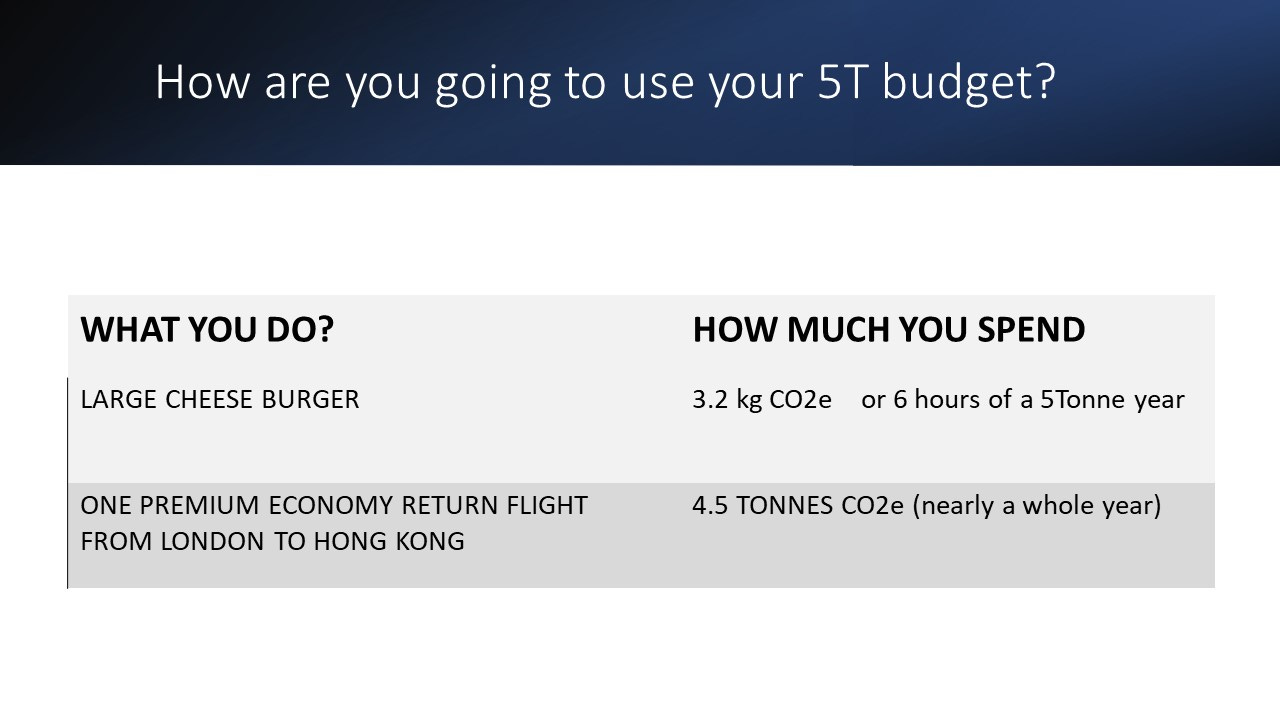Brits Today: Emitting More Than The Chinese but Less Than The Americans
Watching TV on your refrigerator? Let's get some perspective

Dear Human of Planet Earth,
How’s your carbon budgeting going? If you’re stretching your pounds or dollars or euros or what have you, you might well be consuming less.
Or maybe not.
A lovely human being told me yesterday she just bought a fridge with a TV screen on it. It’s a very smart screen. Better than an ordinary TV, it can tell you if you’re running out of milk, and show your photo memories too. What’s not to love?
My jaw dropped.
‘Close your mouth,’ she said jokingly, and proceeded to show photos of the fancy fridge.
Apparently, watching TV from your refrigerator isn’t a new idea. But I’m almost a Luddite. What would I know?
No way do I protest against the carbon budget of a friendly acquaintance at a party. I just write this newsletter.
(Friendly acquaintance, if you read this letter, don’t dump your new fridge. Care for it and use as long as you can. Not replacing functional tools is a cornerstone of sustainable living. But mind your carbon budget next time).
Let’s talk about consumption. Numbers can be helpful when we want an accurate perspective.
Mike Berners-Lee always includes estimates of manufacturing and transport in his CO2e calculations and that’s why I’ll refer to his figures regularly when I write to you. Once we include the carbon footprint of manufacturing and transporting stuff, we find it’s not humans in China and India, or heavily populated Indonesia and Nigeria, carrying the heaviest individual footprints.
Take a look at the table below:
The figures in the table are averages, but within every country, the wealthy and middle-class have a heavier carbon footprint than the very poor. Some of them (or us, if that’s you too), might have solar panels and electric cars but they/we consume more ‘stuff.’ And production and transport of ‘stuff’ has a carbon footprint of its own.
It takes the average American just a couple of days to clock up the annual footprint of the average Nigerian or Malian. The global average is just over 7 tonnes per person. - Source: How Bad Are Bananas? by Mike Berners-Lee
Some of our footprint is down to factors outside our individual control.
eg Much greater use of renewables for the UK electricity grid is a major factor in the average UK-based human consumption going down from 15 tonnes CO2e to 13 tonnes CO2e in ten years.
Your friend may not care less about sustainability and the climate crisis, but if the grid they’re using is running on more and more renewables, their carbon footprint is going down with it - unless they are changing their lifestyle even faster towards more and more consumption …
You get the picture.
Thinking about carbon footprints is like thinking about expenditure. While we exchange money for goods, we add emissions to the atmosphere. But just as a budget stops you spending more money than you have, if you had a carbon budget and a way to estimate how your choices weighed into that budget, you could manage your emissions better.
In the 2010 edition of How Bad Are Bananas?, Mike Berners-Lee suggested his UK and Europe-based readers could aim to reduce their emissions by a third in the short-term. Back then, that would have meant a 10-tonne lifestyle, or carbon budget.
Why not zero? The infrastructure isn’t there for zero. Responsible government policy needs to build that infrastructure - with our support. Or even without it.
Anyway, ten years later, with global emissions rising and time running out, the 2020 edition of How Bad Are Bananas advocates for a 5-tonne lifestyle.
Even this isn’t sustainable in the long term, but a car speeding at 100 mph can’t stop in an instant, even if it’s heading for a cliff. Likewise, your environment doesn’t yet facilitate you taking your emissions from 13 or 20 CO2e/year to zero overnight.
5CO2e/year is possible, all while pressing policymakers for green infrastructure to take us down to zero. Or even negative figures, but that’s another story.
To begin to put meaning to the idea of a 5T lifestyle, compare having a cheeseburger to a return trip to Hong Kong from the UK:
Now I drive a petrol-burning car myself. I’ve started taking dashboard and petrol pump photos every time I go to the pump. I’m tracking my petrol usage this year in an effort to measure my efforts to drive less.
In my next letter, I’ll be estimating how much of my 5-Tonne carbon budget I’ve used up by driving in 2022 so far.
Thanks for reading and see you next time!
With Love,
Your Friendly Neighbourhood Radical,
Croydon, London.
From the patch of earth known as the UK
(Lat +51.51, Long -0.118)
PS a few suggestions:
if you need to watch TV in the kitchen, use a gadget you already have - your phone or tablet. Just don’t let it fall into a pot of boiling water or leave it on the hob of the stove.
And if you need an alert system for running out of milk, make it the duty of the person who forgets to raise the alarm after draining the carton to pack the dishwasher for a week, or clean the fridge. A smart fridge can tell you stuff but it can’t do housework!





